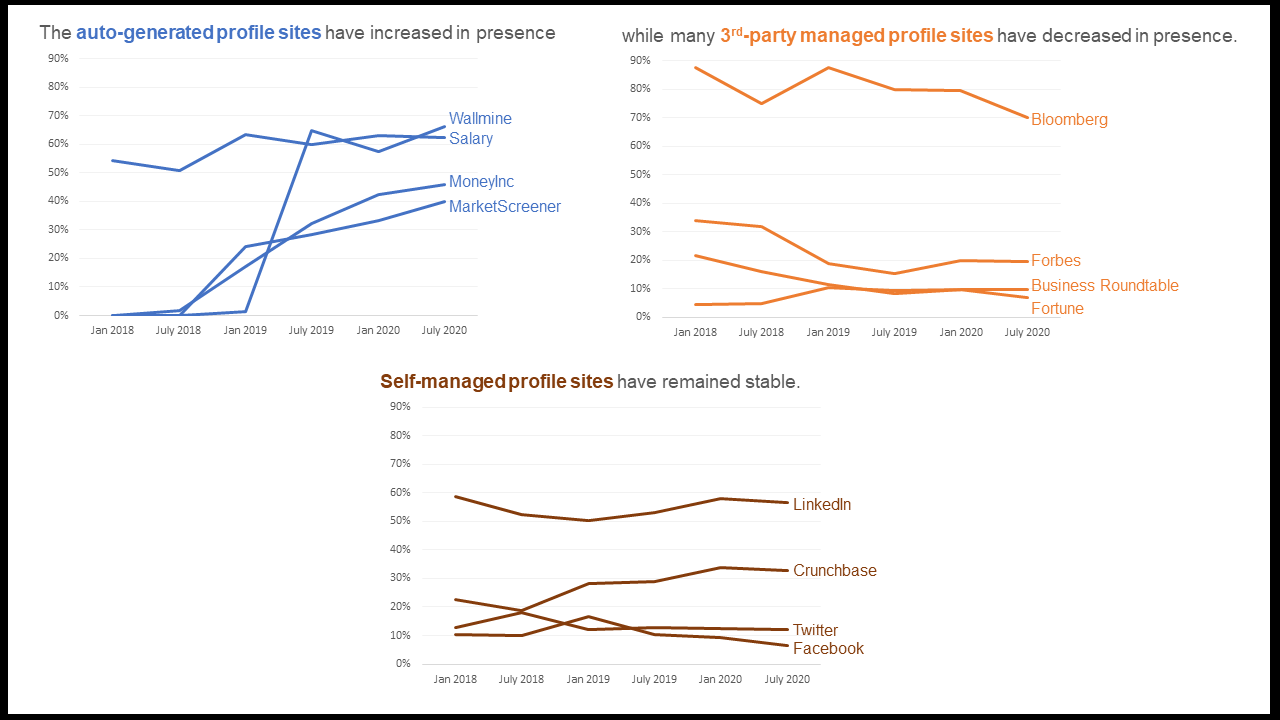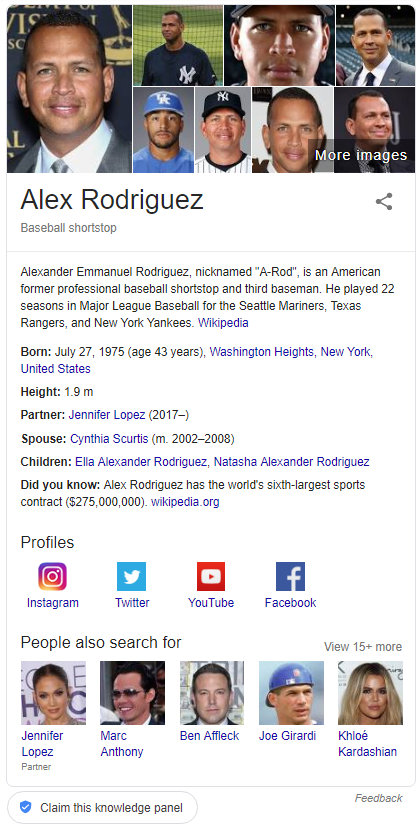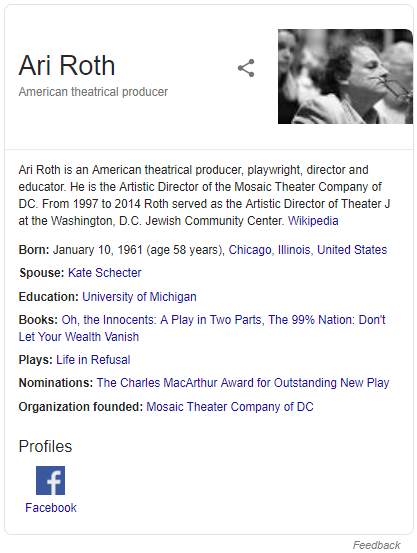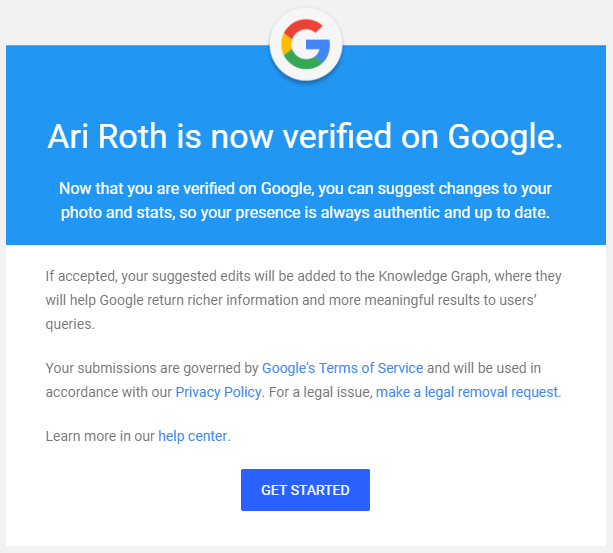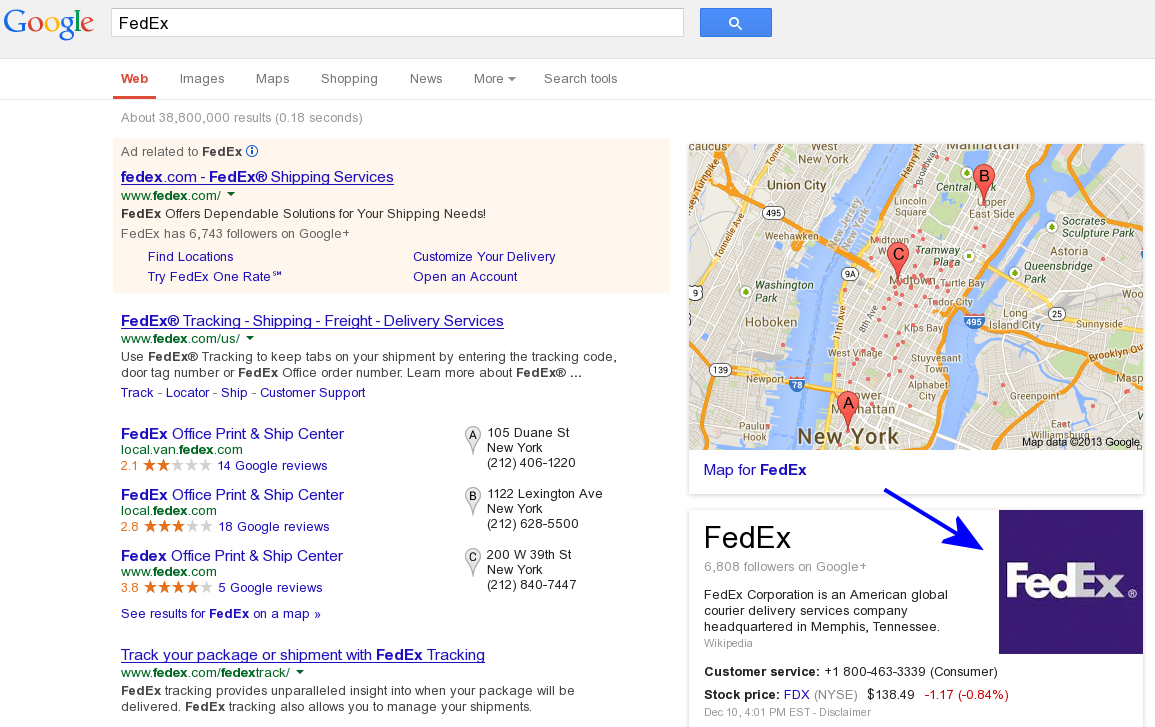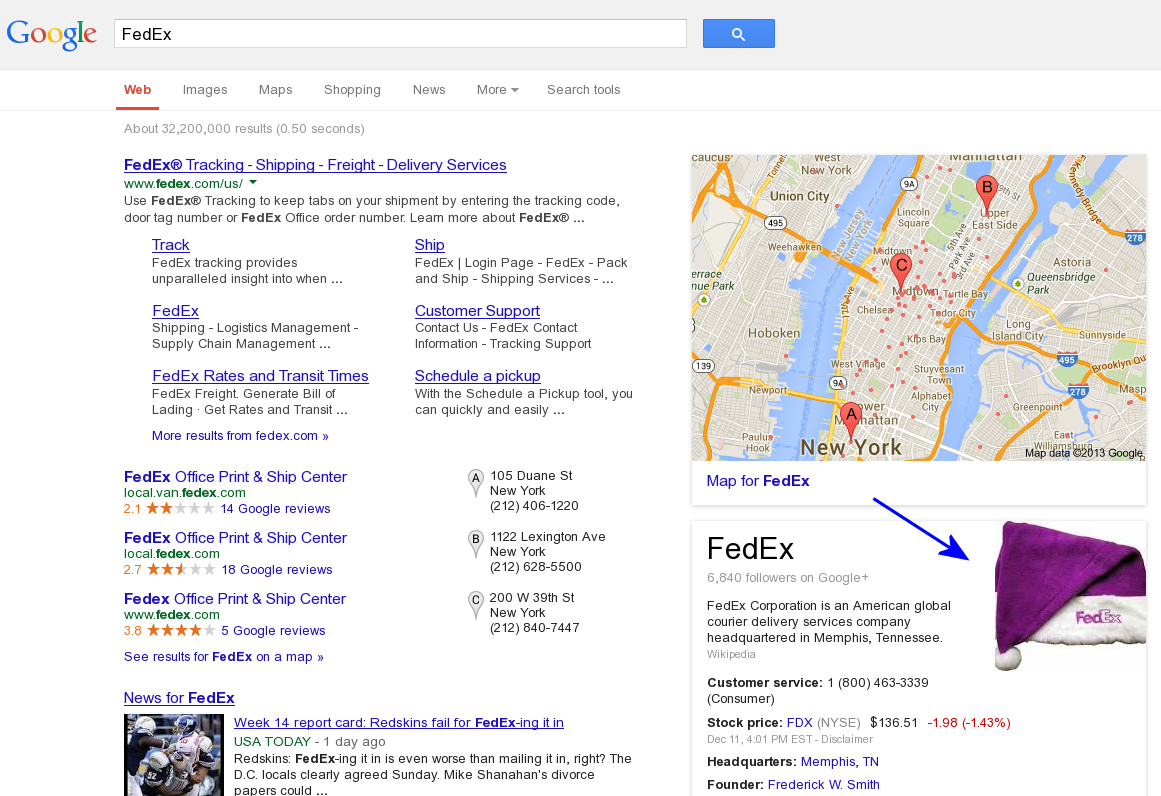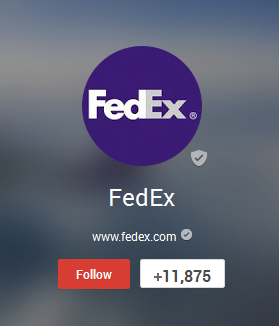Just the Facts: The rise of auto-generated profile sites, and what that means about the direction of search
People like to do quick, basic research before engaging in business. As the go-to place for that research, Google’s page 1 has become a kind of dossier about people and brands. This is why the Knowledge Panel (the summary info that typically appears on the top right part of the Google search results page) has become the gold standard for quick stats of notable individuals. It’s also why the People Also Ask box, with its quick and easy question and answer format, has been pushed front and center by Google. It’s as if searchers have repeatedly said to Google, “Just the facts, Ma’am,” and Google has complied.
Typically, results for top CEOs will include their Wikipedia page, their company’s website, top news stories, and various types of profile sites, which provide a quick snapshot of facts for users.
(Note: Perhaps the most interesting data point for many searchers is CEO salary: we found this in a previous study we did on the People Also Ask box. 22% of all questions appearing for Fortune 100 CEOs relate to their salaries.)
We recently surveyed Google results for Fortune 500 CEOs over three consecutive years (on the same dates) to assess the changing prominence of different kinds of profile sites in their top results.
We found that self-managed profile sites – LinkedIn, Twitter, and Facebook (in addition to Crunchbase, which can be self-managed) – have remained more or less stable in terms of their prevalence on page one for CEOs.
At the same time, third-party profile sites, like Bloomberg, Forbes, Fortune, and Business Roundtable have slightly decreased in page one presence for CEOs over the years. Bloomberg, for example, appeared in page 1 search results for nearly 90% of these CEOs through early 2019; today that’s down to 70%.
The sites that have risen in prominence are auto-generated profile sites, which pull relevant information from multiple websites and databases to create a one-page dossier on executives. These sites, namely Wallmine, Salary, MoneyInc, and MarketScreener, have significantly risen in prominence over the years. Wallmine in particular saw a meteoric rise in 2019 – from appearing for just 1% of CEOs to 65% of them within that same year.
What is interesting about this trend toward automatically created “scraper” sites is that they don’t seem to add a whole lot of value. What are they doing that Google cannot do by itself? Google’s algorithm already tends to prioritize pages and sites that help it answer popular questions and meet the common need for quick facts. Google does this by crawling much of the internet and then displaying the best pages and data points.
When companies do the same type of summarizing, this can be useful to visitors…but only for a time.
Some years ago we saw the same dynamic play out with Answers.com. In order to answer questions people often searched online, that site scraped various authoritative sources and created answer pages – which ranked prominently for tens of thousands of terms. Eventually, though, Google applied a more sophisticated duplicate content filter, demoted Answers.com, found other sites that added more original value, and added its own “dossier” features as discussed above. Answers.com simply wasn’t adding enough value to last long term.
So while right now there are several automatically generated profile websites appearing for many prominent individuals, some of which can actually be managed to some extent (MarketScreener offers an option for a paid profile, for example), we predict that these sites will not retain their prominence long- term.
In our estimation, for a site to remain relevant and prominent in Google search, it needs to add unique value, providing information or an experience that other sites do not…and that Google can’t manage on its own with its own knowledge graph data.
Ideally, sites that want to go the distance should be filling a gap – providing some deeper answers to the popular questions people have, adding images or videos where those are missing to flesh out someone’s persona, or providing information in a language that is not covered.
Google is a reflection of what people want to see, and people seem to want to see a quick and comprehensive picture. Staying valuable will require a heavier lift for content writers and researchers. The robots – the automated content aggregators – will need to find some other, more helpful, work to do.
About the author:
Miriam Hirschman., Research Manager at Five Blocks, is driven by an endless supply of curiosity and a deep background in data analysis as she digs for the interesting stories behind the numbers. Because we believe in data and tools but believe in people even more, she reviews massive volumes of search results, seeking patterns and finding order in the often chaotic world of web search.
Google and the Case of Mistaken Identity
It started with the best of intentions.
In June 2018, Google announced a new feature which would help individuals and businesses better manage their presence in search results. Per the announcement, “When you search for well-known people, organizations, and things on Google, you’ll often come across a Knowledge Panel on the results page—a box with an overview of key information and links to resources to help you go deeper.”
For those who aren’t familiar, below is an example of a Knowledge Panel, found in a search for former baseball player Alex Rodriguez (“ARod”):
The Problem with Knowledge Panels, and Google’s Solution
With the Knowledge Panel, there is the potential for Google to accidentally spread out-of-date or inaccurate information. Imagine that tomorrow Jennifer Lopez breaks ARod’s heart. Would she still be listed as his partner in the Knowledge Panel shown above?
Unfortunately, we’ve found that Google is not the best at updating these Knowledge Panels to account for new information – see this example where Google showed the wrong CEO for a major corporation for over a year after he stepped down!
To counter this, Google now offers companies and individuals the ability to “Claim this knowledge panel” via the button at the bottom of the screenshot above. This feature allows the verified entities to directly submit change requests to expedite changes for out-of-date or inaccurate information.
Seems like a good solution!
Intelligent digital reputation management requires that we follow these features closely, so we are always thinking critically about what each development means for our diverse set of clients.
Because we try to err on the side of caution, when the feature was launched we immediately contacted relevant clients and advised them to claim their Knowledge Panels to ensure that others could not use the feature to request negative or malicious changes.
The “Solution” Breeds Another Problem…
Here’s where it gets interesting.
Last week, I was looking into a Knowledge Panel-related issue for a client when I decided to see how real this risk was. You see, there is another Ari Roth out there who is significantly more famous than I am. This other Ari Roth has a Wikipedia page, and because of this, a Knowledge Panel about him appears when you Google “Ari Roth”:
This Ari Roth actually has some of the issues I described above. Specifically, the Facebook button listed at the bottom links to *MY* Facebook profile. This is not the first time that something like this has happened. Below is a screenshot I took back on May 2nd when I noticed that it was my Twitter profile appearing:
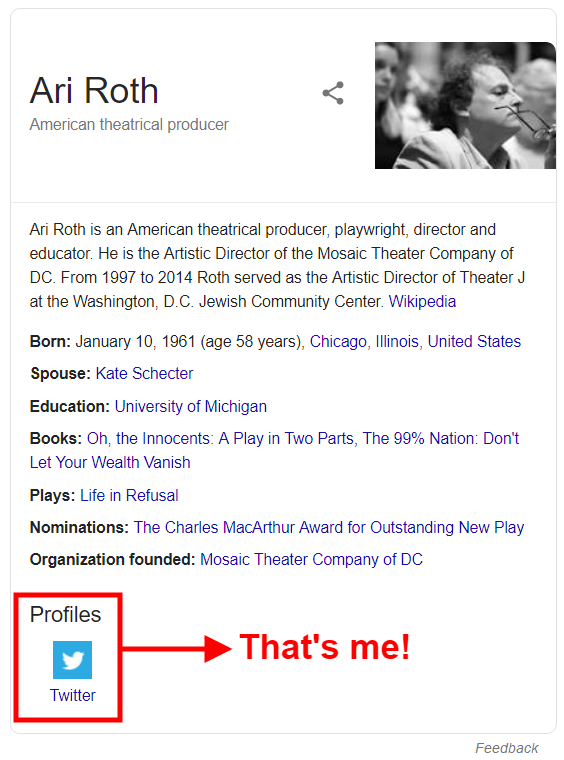
To test Google’s system, I decided to submit a claim to this Knowledge Panel.
While you can choose to provide them with screenshots showing you logged in to associated social media profiles, the only mandatory form of identification which the form requires is a selfie while holding government-approved photo identification.
I filled out the form, providing the selfie with my ID, as well as screenshots showing me logged in to my Facebook and Twitter profiles, assuming and hoping on behalf of my clients that Google would realize that I was a different Ari Roth (there is a 25 year difference in our ages, for starters) and reject my request.
Mistaken Identity: Confirmed by Google
Sadly, a few days later, Google proved my assumption wrong when I got the following email:
Apparently, whoever was reviewing the verification requests did not bother to compare my selfie or the biographical information provided by my social profiles to images and biographical information for the Ari Roth who is actually described in the Knowledge Panel.
Even a surface level review of this information would have clearly confirmed that I was not the Ari Roth in question. Instead, it seems that anybody with the same name can be granted access to edit your online reputation. In an extreme case, I even wondered if I could game the system by legally changing my name to Alex Rodriguez. 🙂 There would be so many perks with that choice!
What Google Should Do Next
To be clear, I do not actually want to manage the search presence for someone who is not me. While the other Ari Roth and I seem to share relatively few commonalities, I have no desire to submit malicious or negative information about him to Google. This was just a test which I performed with a disappointing result. I hope that Google will read this, manually revoke my access to the Knowledge Panel in question, and adjust their internal processes so that others do not fall prey to someone with malicious intent.
But my hopes for what Google will do have been let down before.
What the Other Ari Roth Should Do Next
Reach out to me via Facebook, Twitter, LinkedIn, fax, carrier pigeon, etc. I’m happy to submit any requested Knowledge Panel changes on your behalf for as long as I control it. Once Google (I hope) revokes my access, click the button to claim your Knowledge Panel for yourself so that this doesn’t happen again. Even a basic search on Twitter turns up tens of accounts under our shared name, and all it would take to change things for the worse is for one of our more malevolent doppelgangers to get control of the knowledge panel.
What *YOU* Should Do Next
Of course, it could have been (and I hope it was) that I just got “lucky” that a distracted Google representative was assigned to review my case. But if it happened to my bizarro Ari Roth, it could happen to you or your company as well. We continue to advise our clients and the public at large to claim their Knowledge Panels to ensure that others cannot claim them first. This is no longer a hypothetical precaution. Your reputation could be in real, practical danger!
Taking a step back to a more macro view, this underscores the great importance for ownership of your personal or corporate brands online. Relying on Google means that your reputation is vulnerable where their algorithms are vulnerable.
And since when do you believe in random results for anything your company does?
Building up your owned websites, social media profiles, and even claiming your Knowledge Panels ensure that you control as much of your digital reputation as you can.
How Deep is Google’s Love?: Where the In-Depth Articles have Gone (and What it Means for You)
Recently, Google appears to have made a significant change to its search results page that eliminated several in-depth articles for many clients. We’ve taken a deeper dive into this development to see what it could mean for brands and high-profile individuals, and the PR professionals who work with them.
As you know, when searching for a brand or an individual, the Google search results page presents a variety of relevant content pieces and types of media to satisfy the query. Often this means a company’s own webpage will appear at the top, followed by third-party content such as Wikipedia and news sources. There may also be social media results (if an individual or brand actively maintains these platforms), along with image results or video content.
Several years ago, Google introduced a section within top search results they called “in-depth articles”. These results looked very similar to other search results, but came from longform media outlets like Variety, Rolling Stone, or The New York Times Magazine. Often, they were a seminal article about the brand in question – articles that may have been placed by their PR teams.
Including these articles on the top results page seems to have been Google’s way of ensuring that a greater variety (and deeper) content would appear in this prime spot. Their inclusion, and the actual articles that appeared within that section, were governed by a different set of algorithms than most search results.
Recently, this section disappeared from all search pages for brands and executives. This happened without any announcement or acknowledgment on the part of Google. It is important to note that in-depth articles for many brands and individuals contained negative content. At the same time, it was the place where particularly engaging longform journalism made its way onto the prime real estate of Google page 1 for a brand.
The ramifications of Google’s elimination of this section are yet to be seen, and their motivation can only be assumed to be “less intervention” following high profile criticism of potential bias in their algorithms.
A whole host of interesting questions arise from Google’s move: What is the corporate (and civic) responsibility of those who hold the world’s data in their hands? Are there cases for intervention? Who decides what those are?
It is interesting to note that alongside this mysterious disappearance, a recent Five Blocks study of CEO search results found there are far fewer news sites (sites such as CNN, CNBC, and others) on the first couple of pages of searches for a CEO compared to a year ago. In addition, those pages feature many more profile sites, where one would find more dry facts (often created by the brand), and less news.
This marked difference in the presence of news within the organic results over the course of the past year, alongside the recent removal of the in-depth article section, means that page 1 of search for brands and individuals will contain far more“owned” content – i.e.: information they control.
For some brands this would appear to be a positive turn of events, but for many this trend means they will not automatically have great media pieces (which they often earned by being genuinely great) appear prominently in searches. It means they will need to work harder to deliberately ensure that the best third-party media does in fact place highly within their profile. Savvy communications teams will find ways to enhance their brands’ online presence within these brave new parameters.
— Sam Michelson, with Sara K. Eisen
It Pays to Be Wordy…And It’s Free!
Twitter jumped into the 2017 holiday season with something new for its 330 million users: the gift of more gab. As of early November, it officially doubled the character limit for a tweet, jumping from 140 to 280 characters.
Reactions so far are split on whether this is a good thing, with some already mourning the loss of creativity forced by the 140-character constraint. However, there is a major hidden benefit to Twitter’s new world of wordy: the way it affects your search results page.
Since August 2015, when someone Googles a term associated with a Twitter account, the search results have included a dedicated space for actual tweets from that account. That’s a win for companies, brands, and people who care about their online presence. It means their voice is right there on the search results page, in a section whose contents they completely control.

With Twitter’s newly doubled character count, we wondered if Google would come along for the ride. Would the Twitter box on the search page double in size? Or would it just cut off the tweet after 140 characters?
The answer? For Twitter boxes featuring the wordier 280-character tweets, the actual box has grown to accommodate the greater length.

This is an incredible branding gift from Twitter and Google, offering even more space in the search results for a brand (or company, or individual) to control and to tell their own story. This is the kind of space brands pay money to have on the search page.
Brands should welcome this gift with open keyboards. They have learned how to be creative in 140 characters; now it’s time to embrace the new challenge to be engaging, yet still pithy, in 280.
What’s more, companies can reap the benefits of a longer Twitter box on the search page without being needlessly wordy all the time. The box works as a carousel, allowing the searcher to scroll horizontally through a few recent tweets, beyond just the first three showing. We discovered that if any of the tweets in the box – even the ones not initially visible – are longer, it lengthens the whole box.

In this new era of Twitter 280, brands have the opportunity to offer deeper thoughts, or even just thoughts that are longer winded. That’s their choice. But now it pays to be wordy – without even having to pay.
How to Change Your Logo in Google Knowledge Graph
Many of our clients are B2B and B2C brands. Their ability to control how their logo appears in Google search results is really important to them. Google has helped these, and other, brands by including their logo as a central element in the Google Knowledge Graph. The ability to dictate exactly which version of the logo is used can be crucial to having the best impact on searchers.
This is how you do it:
- Use your preferred logo as the logo for your brand’s official Google+ profile (use verified name and link to your main website).
- If there is a Wikipedia page for your brand, make sure the logo image is your preferred version.
- Use Schema.org’s organization markup to indicate to Google the preferred logo. Google has said they will honor that (presumably in the absence of a Google+ logo).
FedEx and Fun with Knowledge Graph Logos
Fedex decided to change their logo to a holiday logo version. On or before Dec 11th, they changed the FedEx logo on their Google+ page to the holiday version.
Shortly thereafter, their knowledge graph logo changed as well.
Before:
After:
Meanwhile – FedEx has changed their logo in Google+ back to the standard logo:
But the Google knowledge graph still has the holiday logo on it.
In SEO, they often say “If you don’t like your results, wait five minutes.”
In this case, I would recommend that FedEx also uses Schema.org’s organization markup on their homepage to indicate to Google the preferred logo.
They can also go back into Google+ and change the logo to a new file in the hopes that Google will detect the change and update the knowledge graph image.
How Agencies Can Help In-House SEO’s
At Five Blocks, we focus on Digital Brand Management and Reputation Management – which require a lot of the same knowledge as SEO. Clients who engage with us for Digital Brand Management often have SEO needs as well – and this is a service we offer. Interestingly, even clients who have their own SEO teams benefit from our services.
A few reasons why in-house SEO teams benefit by working with an agency.
1) When I started optimizing my first website in 2003, it was reasonable for one or two people to take on all of the responsibilities of optimization. Since then, there has been an explosion of different angles that should be addressed: Webmaster Tools, sitemaps, landing page optimization, new search engines, video optimization, etc.
2) Because we service tens of clients, we can afford to maintain a team of writers and many web assets on a variety of topics. We can provide SEO services to these clients without having to create completely new assets or hire new writers.
3) We are exposed to clients in many industries – and are challenged every day across tens of clients. As we meet each challenge, we are able to apply the lessons to additional client programs. In-house SEOs are not typically exposed to too many clients at any given time.
Taken together, it is reasonable for a company to have one or more in-house SEOs and for those SEOs to work with an external team who can help achieve measurable results by leveraging the agency’s resources, tools, and knowledge.
